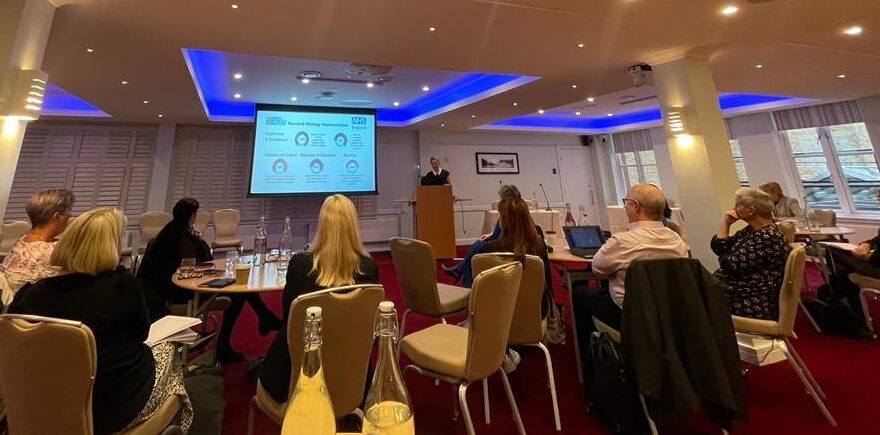Chief Nurse Research Requirements Workshop
- October 18, 2022
The Florence Nightingale Foundation (FNF) in partnership with NHS England and Improvement (NHSE/I) are undertaking a Thought Leadership Project exploring the research requirements of Chief Nurses needed to embed a culture of research and evidence-based practice. It is acknowledged that post holders commonly have professional responsibility for midwifery and allied health professions, and therefore the benefits of this project are likely to extend to other disciplines.
In 2021, Ruth May, Chief Nursing Officer (CNO) for England set out a strategic plan for research. It outlined the CNO’s ambition to, [1] “Create a people-centered research environment that empowers nurses to lead, participate in and deliver research, where research is fully embedded in practice and professional decision-making, for public benefit”.
On 4 October in collaboration with NHSE/I, FNF facilitated a co-production workshop with Chief Nurses across England exploring what support they believe Chief Nurses require in order to implement the CNO’s strategic plan for research. Professor Alison Richardson said it best, “A special time we probably will not have again!”.

FNF were thrilled to gain a deep-rooted understanding of the requirements of Chief Nurses needed to embed a culture of research and evidence-based practice. In addition to the work at hand, it was an ideal opportunity for networking and knowledge sharing with other likeminded colleagues present.
Attendees first heard from Professor Greta Westwood who solidified the importance of this co-production workshop and expressed her sincere commitment to supporting Chief Nurses to take the research agenda forward in their organisations. Greta then welcomed Chief Nurse & Deputy CEO of Health Education England (HEE), and Deputy CNO for England, Professor Mark Radford to take to the floor. Mark set the scene for the day delivering a presentation on the strategic plan for research and ‘Making Research Matter to Nurses’. Mark engaged the room through sharing examples of how he had influenced the research culture when he was the role of Chief Nurse through building partnership with different Universities who had the expertise to partner on the priorities relevant to his organisation. Also, how research had been directly utilised to identify factors influencing patient safety which went onto inform workforce planning and resource allocation.
Next on the agenda, the room heard presentations from the following guest speakers:
- Professor Cheryl Lenney: Developing an Organisational Approach
- Professor Alison Richardson: CNO Team Research Insights
- Professor Chris Burton: Academic Nursing Leadership – Perspectives from the Council of Deans for Health (CoDH)
- Professor Patrick Callaghan: Creating Partnerships with Higher Education Institutions (HEI’s)
- Professor Ruth Endacott: National Institute for Health and Care Research (NIHR) Insights
Exploring what worked and lessons learnt in these different examples gave each leader in the room a sense of the success factor which would enable the strategic plan for research to be applied to their specific context. FNF want to take this opportunity to thank each speaker once again for sharing their expertise with us.
Lunch and further networking commenced before the afternoon workshop session was opened by Professor Gemma Stacey. Gemma described the details of the project which has so far entailed a survey and focused discussions. The survey was conducted in August 2022 and the initial analysis was shared with attendees. The initial survey has told us that training in conducting research is not a requirement for this group. However, they do have a desire to understand best practice in research as a mechanism to set standards and advocate for their workforce. The confidence and authority to implement the strategy and influence the research agenda by securing the associated resource allocation is paramount. It was clear that Chief Nurses are aware of their potential to influence the development of a culture of nurse led research and are motivated to do so due to their conviction in the value of evidence-based practice for improved patient outcomes. Identifying and securing investment and advocating for nurses was seen as their most important areas of responsibility. “My obsession is the next generation of nurse/research leaders and investing in them now!” – Professor Patrick Callaghan.
A co-production workshop was then facilitated to understand the requirements of Chief Nurses working in different contexts and with varied levels of experience in implementing a research strategy. The room explored the content, delivery methods, ongoing support and impact measures needed to truly enable nurse-led research. The insights the FNF Research and Policy Team gained during the workshop are invaluable to the project development and proposed programme which will be put in place to meet the requirements the Chief Nurses identified.
As the day concluded, #TeamFNF felt inspired by the contributions to the day and the clear commitment to making research matter for every nurse in their organisation. As Professor Chris Burton stated, “We need to develop good quality nursing research. We need a shared architecture to be able to do so”.
Next steps for FNF include a series of focused discussions, group and one-to-one interviews, taking place from mid-October through to mid-November. If you’re a Chief Nurse interested in supporting this project, please reach out to the Research and Policy Team for further information.
As always, many thanks for supporting FNF.
Greta, Gemma, and The Research and Policy Team.
[1] Making research matter Chief Nursing Officer for England’s strategic plan for research. Version 2, November 2021 – https://www.england.nhs.uk/wp-content/uploads/2021/11/B0880-cno-for-englands-strategic-plan-fo-research.pdf